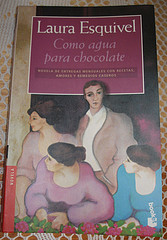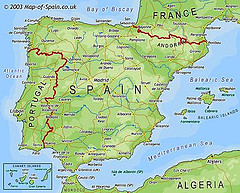SYNOPSIS
This film is based on the novel by Laura Estivel and was produced by the director Alfonso Arau in Mexico in 1992. The main character is Tita the youngest daughter of Mamá Elena, and the central storyline concerns the strict custom in those times which required the youngest daughter to care for her mother until she died. The poor Tita has no option but to bow to this cruel custom despite her love for boyfriend, Pedro.
The story takes place against the backdrop of the Mexican Revolution around the turn of the 19th century. Pedro has asked to marry Tita but Mamá Elena refuses permission and instead offers the hand of her other daughter, Rosaura. The wedding goes ahead and Pedro tells Tita he only married her sister so that he could keep near to Tita. Disconsolate, she takes refuge in the kitchen and magically transfers her feelings into the food that she cooks. The kitchen eventually becomes a meeting place for Tita and Pedro.
When Pedro and Rosaura have a baby son Tita looks after him and even feeds him her own milk. However Mamá Elena is suspicious of Tita and Pedro and arranges for Pedro, Rosaura and baby son to go to live in Texas where there is better medical care for the child. Unfortunately, because the baby loses Tita`s milk he becomes ill and tragically dies anyway. This drives Tita to a breakdown and she leaves the ranch to be cared for by a doctor family friend. However she does not speak for months, until a visit from a childhood friend helps her to recover.
Then Mamá Elena dies in an accident and Tita returns to the ranch and meets up again with Pedro. When Rosaura and Pedro have another child, Esperanza, she also likes cooking and spends time in the kitchen with Tita. Finally Tita and Pedro get together in a spectacular, emotional and fiery end to the story.
There are great performances from Lumi Cavazos as Tita, and Regina Torne as her formidable mother. Entertaining cameos are created by Chencha, Gertrudis and Pedro. It`s an entertaining tale, well worth watching
.
|
|
SINOPSIS
La película está basada sobre la novela de Laura Estival y fue producido por el director Alfonso Arau en México en 1992. La carácter principal es Tita, la hija más jóven de Mamá Elena, y la trama sigue la tradición estricta en esta época que requería la hija más jóven de cuidar a su madre hasta que la muerte. La pobre Tita no tuvo opción sino que obedecer a esta tradición a pesar de su amor por su novio, Pedro.
La historia tiene lugar en la época de la revolución mejicano, alrededor del final del siglo XIV. Pedro ha pedido permiso para casarse con Tita pero Mamá Elena no acepta la propuesta y le ofrece la mano de su otra hija, Rosaura. Pedro se casa con Rosaura pero dice a Tita que lo ha hecho sólo para acercarse a Tita. Desconsolada, busca refugio en la cocina y transfere sus sentimientos a la comida que coce de manera mágica. Después de poco, la cocina se convierte en un lugar donde se encuentran Tita y Pedro.
Cuando Pedro y Rosaura tienen un hijo, Tita le cuida y aún le da el pecho a él. No obstante, Mamá Elena desconfia de Tita y Pedro y lo arregla para que Pedro, Rosaura y su hijo se vayan a vivir en Texas, donde hay mejor asistencia médica para el niño. Desgraciadamente, como el bébé pierde la leche de Tita, se pone enfermo y de todos modos muere trágicamente. Esta muerte causa a Tita de sufrir un crisis y dejar la hacienda. Un médico, amigo de la familia, cuida de ella pero ella no habla durante meses, hasta que la visita de una amiga de juventud le ayuda a recuperarse.
Entonces Mamá Elena muere en un accidente y Tita vuelve a la hacienda y le encuentra otra vez con Pedro. Cuando Rosaura y Pedro tienen otra hija, Esperanza, a ella le gusta cocinar y pasar tiempo en la cocina con Tita. Finalmente, Tita y Pedro se juntan en un final espectácular, emocional y ardiente de la historia.
Las interpretaciones de Lumi Cavazos como Tita y Regina Torne como su madre tremenda son muy fuertes. Chencha, Gertrudis y Pedro dan cameos divertidos - es una historía divertida y vale la pena verla. |








